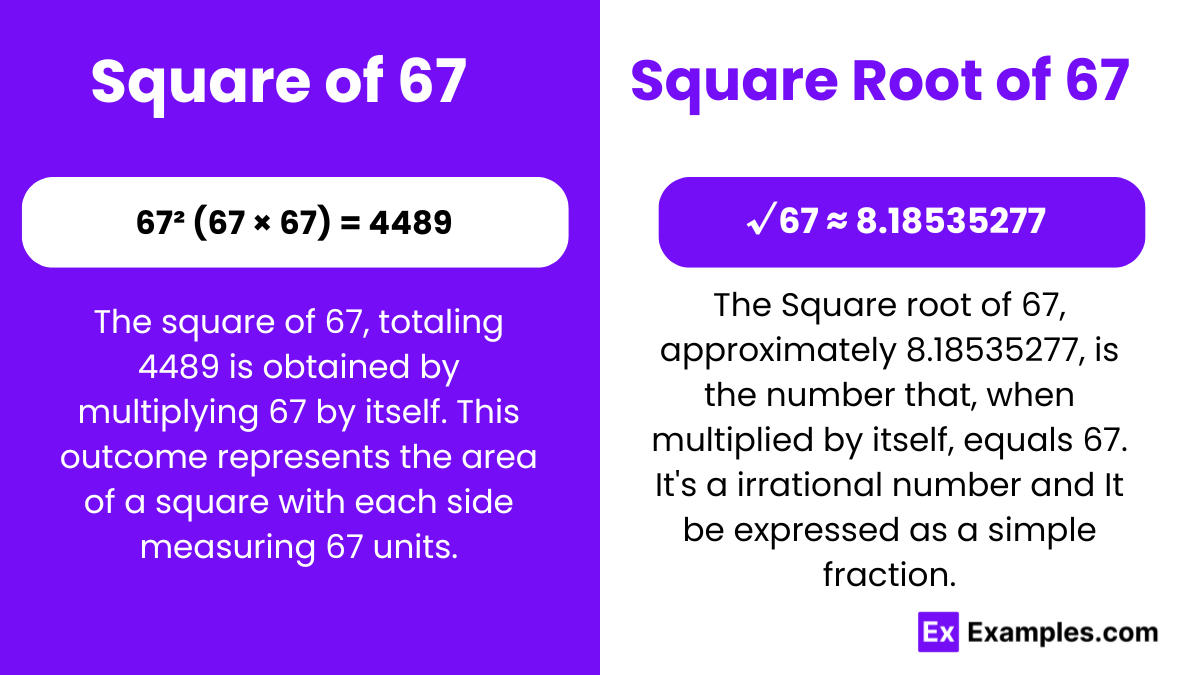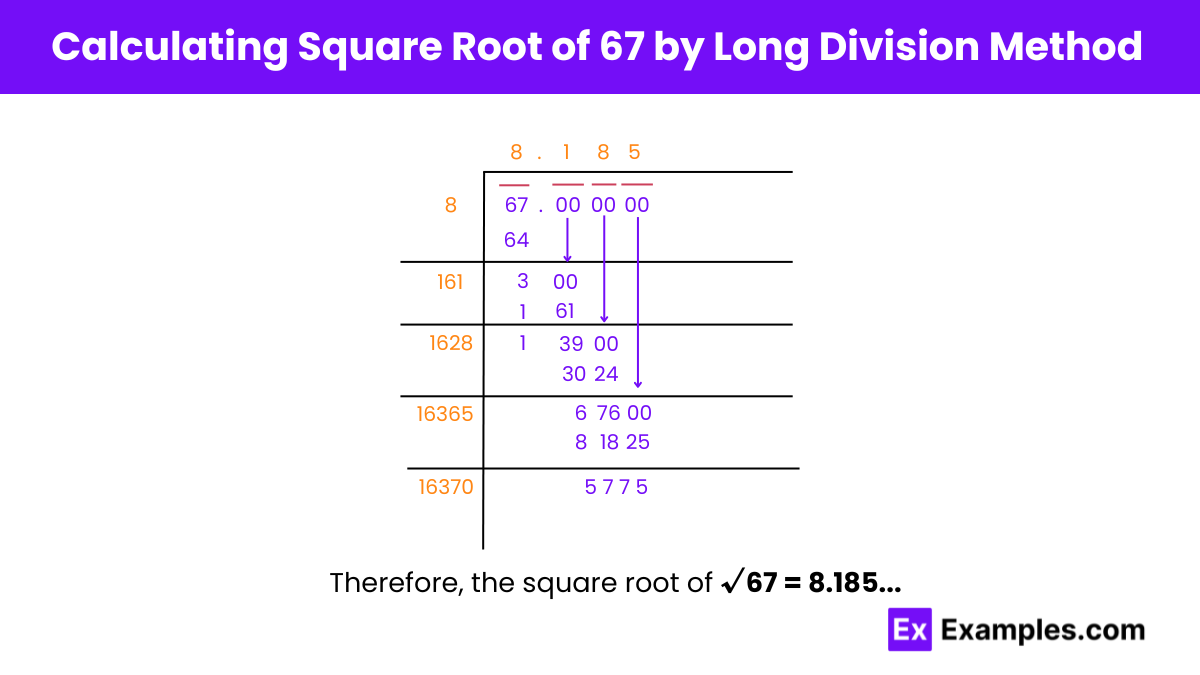What is the square of 67?
4356
4489
4624
4761


Within the domain of algebraic mathematics, squares and square roots hold significant importance. Squaring a number, such as 67, entails multiplying it by itself, yielding 4,489. This foundational operation is vital for exploring rational and irrational numbers. A grasp of these fundamentals enriches understanding of mathematical relationships and patterns. Squares illuminate inherent number properties, while square roots unravel intricate numerical mysteries. These concepts serve as beacons, guiding mathematical explorations into fractional territories. Proficiency in squares and square roots equips mathematicians to navigate varied mathematical landscapes, unveiling the elegance and complexity inherent within algebraic frameworks.
The square of 67 equals 4,489, obtained by multiplying 67 by itself, a fundamental operation in algebraic mathematics, uncovering inherent number properties.
The square root of 67 is approximately 8.19. This fundamental mathematical operation reveals the value that, when multiplied by itself, equals 67.
Exponential Form: 67^½ or 67^0.5
Radical Form: √67
Rational numbers are expressible as the quotient of two integers. Irrational numbers, however, cannot be represented as fractions of integers. Examples of irrational numbers include the square roots of non-perfect squares.

Pair the digits: “67” becomes “67.00 00 00”. The largest number whose square is ≤ 67 is 8 (since (8² = 64)). Write 8 and subtract (64) from (67), leaving (3). Bring down “00” to make (300).
Double 8 to get 16. Find a digit that fits: (161 × 1 = 161). Subtract (161) from (300), leaving (139). Bring down “00” to make (13900).
Double 81 to get 162. Find a digit: (1628 × 8 = 13024). Subtract (13024) from (13900), leaving (876). Bring down “00” to make (87600).
Double 818 to get 1636. Find a digit: (16365 × 5 = 81825). Subtract (81825) from (87600), leaving (5775). Bring down “00” to make (577500).
Double 8185 to get 16370. Find a digit: (16370 × 0 = 0). Subtract (0) from (577500), leaving (577500).
The process gives the square root of 67 as approximately (8.185).
A perfect square can be expressed as the square of an integer. Therefore, the square root of 67 is an irrational number.
No, 67 is not divisible by any perfect squares.
The nearest whole number to √67 is 8.
It’s an irrational number between 8 and 9.

Within the domain of algebraic mathematics, squares and square roots hold significant importance. Squaring a number, such as 67, entails multiplying it by itself, yielding 4,489. This foundational operation is vital for exploring rational and irrational numbers. A grasp of these fundamentals enriches understanding of mathematical relationships and patterns. Squares illuminate inherent number properties, while square roots unravel intricate numerical mysteries. These concepts serve as beacons, guiding mathematical explorations into fractional territories. Proficiency in squares and square roots equips mathematicians to navigate varied mathematical landscapes, unveiling the elegance and complexity inherent within algebraic frameworks.
67² (67 × 67) = 4489
The square of 67 equals 4,489, obtained by multiplying 67 by itself, a fundamental operation in algebraic mathematics, uncovering inherent number properties.
√67 ≈ 8.18535277
The square root of 67 is approximately 8.19. This fundamental mathematical operation reveals the value that, when multiplied by itself, equals 67.
Square Root of 67: Approximately 8.19
Exponential Form: 67^½ or 67^0.5
Radical Form: √67
The square root of 67 is irrational.
Rational numbers are expressible as the quotient of two integers. Irrational numbers, however, cannot be represented as fractions of integers. Examples of irrational numbers include the square roots of non-perfect squares.
Prime Factorization Method: Break down 67 into its prime factors. However, since 67 is not a perfect square, its prime factorization results in a mixture of prime factors.
Long Division Method: Utilize the long division algorithm to approximate the square root of 67 iteratively.
Using a Calculator: Most calculators are equipped with a square root function, enabling direct calculation of the square root of 67.
Estimation: As 67 falls between the perfect squares of 64 (8 × 8) and 81 (9 × 9), an estimate can be made that its square root is likely between 8 and 9, closer to 8.

Setup and Initial Step:
Pair the digits: “67” becomes “67.00 00 00”. The largest number whose square is ≤ 67 is 8 (since (8² = 64)). Write 8 and subtract (64) from (67), leaving (3). Bring down “00” to make (300).
First Division Step:
Double 8 to get 16. Find a digit that fits: (161 × 1 = 161). Subtract (161) from (300), leaving (139). Bring down “00” to make (13900).
Second Division Step:
Double 81 to get 162. Find a digit: (1628 × 8 = 13024). Subtract (13024) from (13900), leaving (876). Bring down “00” to make (87600).
Third Division Step:
Double 818 to get 1636. Find a digit: (16365 × 5 = 81825). Subtract (81825) from (87600), leaving (5775). Bring down “00” to make (577500).
Fourth Division Step:
Double 8185 to get 16370. Find a digit: (16370 × 0 = 0). Subtract (0) from (577500), leaving (577500).
Final Calculation:
The process gives the square root of 67 as approximately (8.185).
No, 67 is not a perfect square.
A perfect square can be expressed as the square of an integer. Therefore, the square root of 67 is an irrational number.
No, 67 is not divisible by any perfect squares.
The nearest whole number to √67 is 8.
It’s an irrational number between 8 and 9.
Text prompt
Add Tone
10 Examples of Public speaking
20 Examples of Gas lighting
What is the square of 67?
4356
4489
4624
4761
What is the square root of 4489?
65
66
67
68
Which of the following numbers squared equals 67?
8
8.5
8.19
9
If a number squared is 67, what is the approximate square root?
8.15
8.18
8.19
8.20
What is the value of 67 raised to the power of 2?
4465
4489
4512
4530
What is the closest whole number to the square root of 67?
8
9
10
11
Find the difference between the square of 68 and the square of 67.
1
2
3
4
What is the product of 67 and its square root?
4489
67
67 × 8.19
67²
Which of these values is closest to the square of 67?
4300
4400
4489
4600
What is the approximate value of √67 rounded to the nearest tenth?
8.1
8.2
8.4
8.5
Before you leave, take our quick quiz to enhance your learning!

